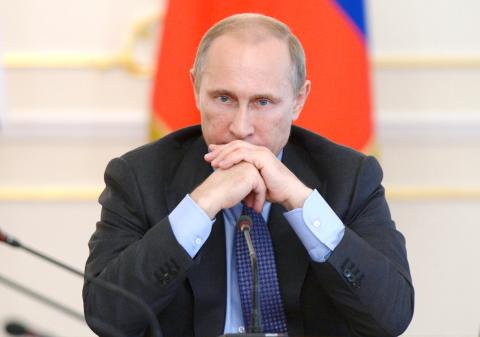A defiant Russia yesterday dismissed unprecedented Western sanctions over Ukraine after Brussels and Washington unveiled the toughest punitive measures against the Kremlin since the Cold War.
The third round of US and EU sanctions aims to force Russia to change tack and halt its support of separatists in Ukraine by targeting its vital financial, arms and energy sectors.
However, Russian Deputy Prime Minister Igor Shuvalov made light of the restrictions, also designed to hit the oligarchs in Russian President Vladimir Putin’s inner circle.

Photo: AFP
“And what about the sanctions? In for a penny, in for a pound,” he quipped to journalists.
Financial institutions put on a brave face, saying their operations would not be affected, while a top official unleashed a diatribe against the administration of US President Barack Obama.
“Obama will go down in history not as a peacemaker — everyone has already forgotten about his Nobel Peace Prize — but as a US president who started a new Cold War,” Alexei Pushkov, chairman of the foreign affairs committee at the Russian parliament’s lower house, said on Twitter.
There was no immediate official reaction from Putin’s office or the Russian Ministry of Foreign Affairs, but Moscow has long insisted sanctions would merely bring Russia’s society together and make its economy more self-reliant.
The stepped-up sanctions came as Moscow dismissed claims it was responsible for supplying the missile that downed Malaysia Airlines Flight MH17, and fighting in Ukraine showed little sign of abating.
They will notably make it tougher for Russian state-owned banks to access European financial markets, forcing their costs higher and hobbling an already struggling economy.
The Central Bank of Russia said that financial institutions were working normally and that if necessary, it would adopt measures to protect targeted lenders, which include the country’s second-largest bank, VTB.
Economists have warned that Europe’s own economy would also suffer from the so-called “sector sanctions” against its biggest source of energy and its major trading partner.
Despite the dismissive talk in Moscow, a number of economists acknowledged the new restrictions would be painful to absorb for Russia, and could stoke social tensions because its economy is sliding toward a recession.
“The current amount of corporate debt is US$700 billion; these debts should be refinanced,” FBK Strategic Analysis Institute Director Igor Nikolayev said, pointing to a lack of cheap loans in Russia.
Nikolai Petrov of the Moscow-based Higher School of Economics said that this time, the sanctions would be felt by everyday Russians — and predicted they would drive an even greater wedge between Putin and the West.
“The confrontation will increase abruptly. Putin has been practically driven into a corner and this man does not make concessions under pressure,” he said.

AGING: As of last month, people aged 65 or older accounted for 20.06 percent of the total population and the number of couples who got married fell by 18,685 from 2024 Taiwan has surpassed South Korea as the country least willing to have children, with an annual crude birthrate of 4.62 per 1,000 people, Ministry of the Interior data showed yesterday. The nation was previously ranked the second-lowest country in terms of total fertility rate, or the average number of children a woman has in her lifetime. However, South Korea’s fertility rate began to recover from 2023, with total fertility rate rising from 0.72 and estimated to reach 0.82 to 0.85 by last year, and the crude birthrate projected at 6.7 per 1,000 people. Japan’s crude birthrate was projected to fall below six,

US President Donald Trump in an interview with the New York Times published on Thursday said that “it’s up to” Chinese President Xi Jinping (習近平) what China does on Taiwan, but that he would be “very unhappy” with a change in the “status quo.” “He [Xi] considers it to be a part of China, and that’s up to him what he’s going to be doing, but I’ve expressed to him that I would be very unhappy if he did that, and I don’t think he’ll do that. I hope he doesn’t do that,” Trump said. Trump made the comments in the context

SELF-DEFENSE: Tokyo has accelerated its spending goal and its defense minister said the nation needs to discuss whether it should develop nuclear-powered submarines China is ramping up objections to what it sees as Japan’s desire to acquire nuclear weapons, despite Tokyo’s longstanding renunciation of such arms, deepening another fissure in the two neighbors’ increasingly tense ties. In what appears to be a concerted effort, China’s foreign and defense ministries issued statements on Thursday condemning alleged remilitarism efforts by Tokyo. The remarks came as two of the country’s top think tanks jointly issued a 29-page report framing actions by “right-wing forces” in Japan as posing a “serious threat” to world peace. While that report did not define “right-wing forces,” the Chinese Ministry of Foreign Affairs was

PREPAREDNESS: Given the difficulty of importing ammunition during wartime, the Ministry of National Defense said it would prioritize ‘coproduction’ partnerships A newly formed unit of the Marine Corps tasked with land-based security operations has recently replaced its aging, domestically produced rifles with more advanced, US-made M4A1 rifles, a source said yesterday. The unnamed source familiar with the matter said the First Security Battalion of the Marine Corps’ Air Defense and Base Guard Group has replaced its older T65K2 rifles, which have been in service since the late 1980s, with the newly received M4A1s. The source did not say exactly when the upgrade took place or how many M4A1s were issued to the battalion. The confirmation came after Chinese-language media reported